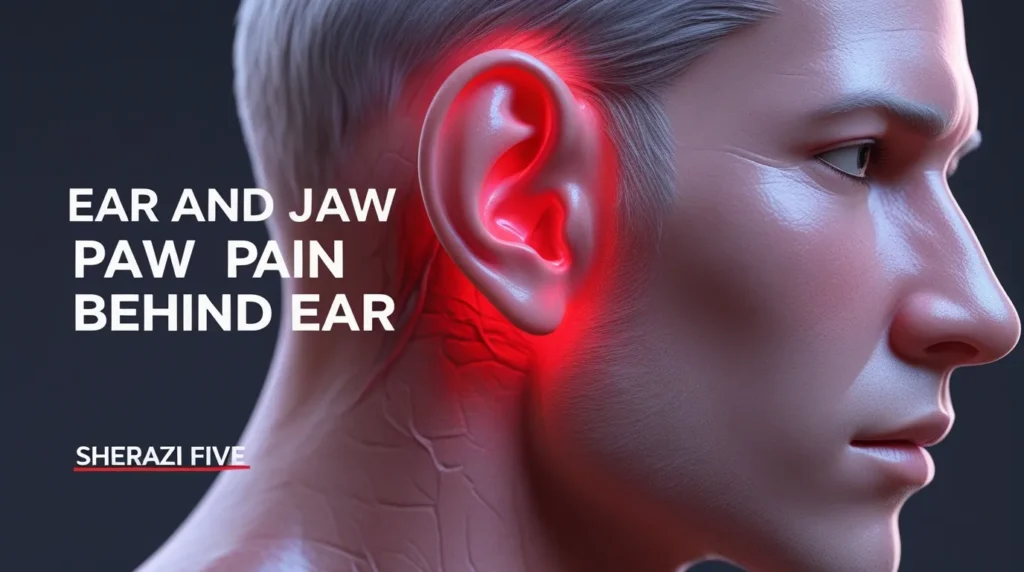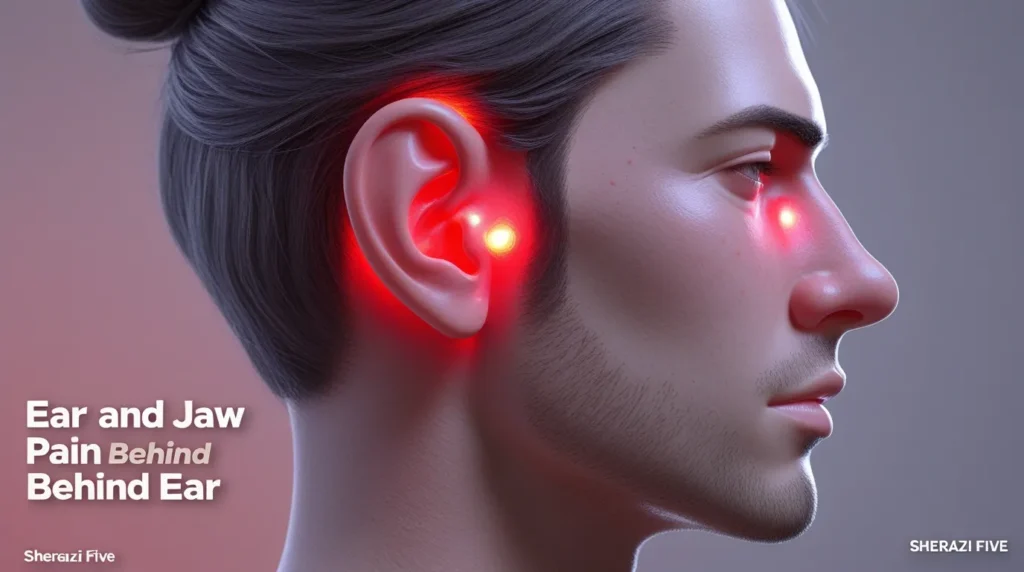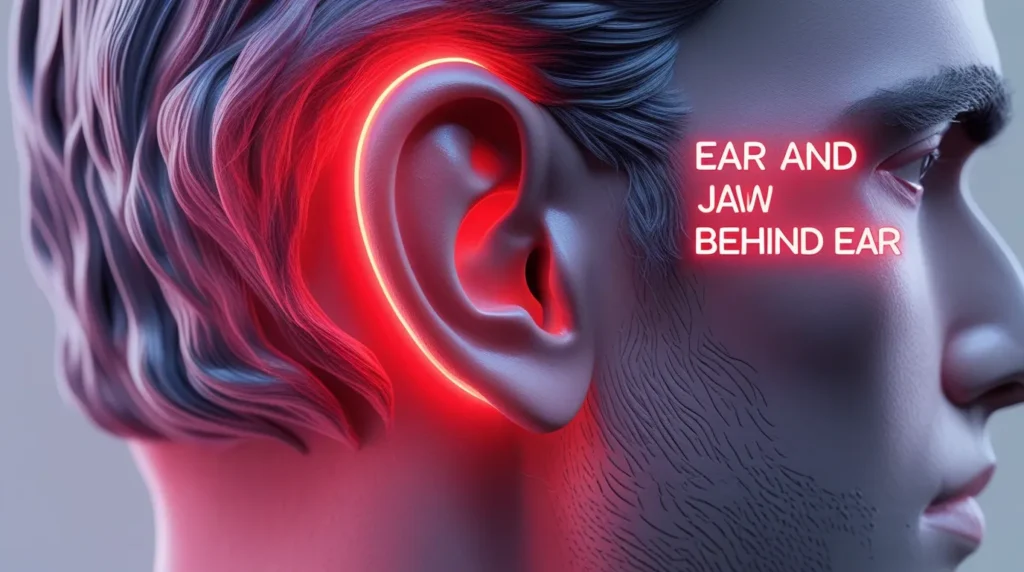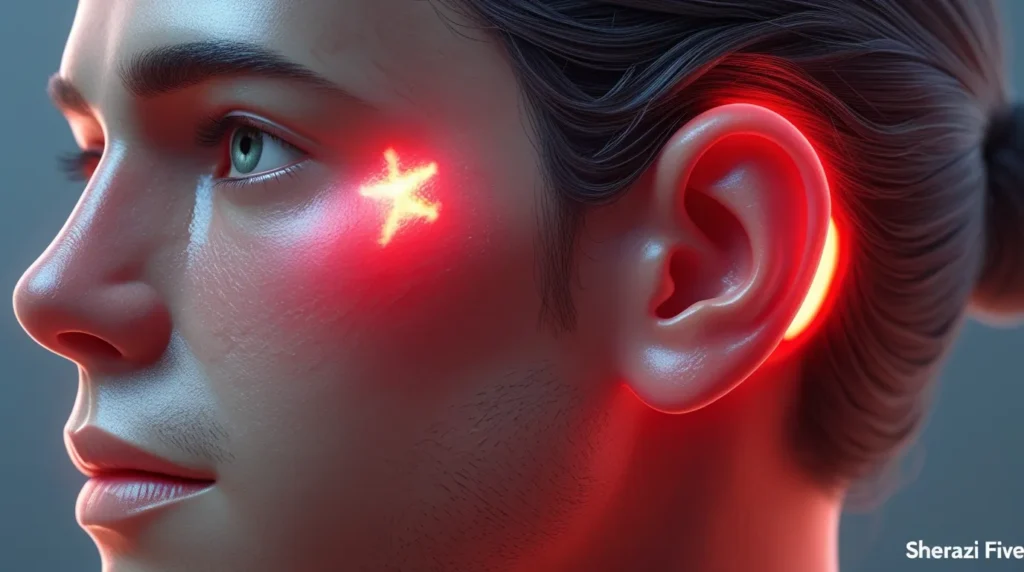Many people experience Ear and Jaw Pain Behind Ear, and it can feel worrying when it happens suddenly or keeps coming back. This pain may show up while chewing, talking, or even at rest, making everyday life uncomfortable.
It often comes from issues like TMJ disorder, ear infection, or toothache, but sometimes it’s linked to deeper health concerns. If left untreated, it may lead to problems like jaw stiffness or swelling around the ear. Understanding the common causes, warning signs, and available treatments can help you find relief faster. In this guide, you’ll discover clear answers to manage and prevent this pain.
What Does Ear and Jaw Pain Behind Ear Mean?
When you feel ear and jaw pain behind ear, it can be sharp, dull, or even throbbing. This type of pain often makes daily life uncomfortable, especially when talking, chewing, or yawning. Many people mistake it for a regular earache, but it can come from different sources such as the jaw joint, muscles, or nerves. Understanding the real cause is the first step toward relief.
Common Causes of Ear and Jaw Pain Behind Ear

Pain behind the ear and in the jaw often has several possible reasons. One common cause is TMJ disorder, which happens when the jaw joint is inflamed or misaligned. Other causes include an ear infection, tooth problems, or sinus pressure. Sometimes, even stress can trigger jaw clenching that worsens the pain. Identifying the cause helps in choosing the right treatment.
symptoms You Should Not Ignore
Along with pain, you may notice signs like swelling behind ear, jaw stiffness, or a dull headache and ear pain at the same time. Some people experience clicking or popping sounds when moving the jaw. If the pain spreads to the neck or causes hearing problems, it may signal something more serious. Never ignore symptoms that last longer than a few days.
Ear and Jaw Pain Behind Ear vs. Other Types of Pain
It is easy to confuse this pain with other problems. For example, toothache may radiate to the ear, while sinus issues can create pressure near the jaw. Here is a simple table to help compare:
| Type of Pain | Location | Other Signs |
|---|---|---|
| TMJ Disorder | Jaw joint, ear | Clicking, stiffness |
| Ear Infection | Inside ear, behind ear | Fever, swelling, hearing loss |
| Toothache | Teeth, gums, ear area | Sensitivity, gum swelling |
| Sinus Pressure | Forehead, cheeks, behind ear | Congestion, headache |
This comparison shows why proper diagnosis is essential for chronic pain.
Medical Conditions Linked With Ear and Jaw Pain Behind Ear

Several medical conditions can cause pain in this area. Mastoiditis, a serious infection of the bone behind the ear, can lead to swelling and severe discomfort. Arthritis of the jaw joint may also trigger long-term issues. In rare cases, nerve pain such as trigeminal neuralgia can cause sharp electric-like sensations near the jaw and ear. Identifying these conditions early is key for treatment.
Diagnosis: How Doctors Find the Root Cause
Doctors use many methods to find out why you have ear and jaw pain behind ear. A physical exam checks for tenderness, swelling, or limited jaw movement. In some cases, they may order X-rays, CT scans, or MRIs to look deeper. Dentists may check for dental issues, while ENT doctors test for ear infection or inflammation. Proper diagnosis ensures you get the right care.
Home Remedies That May Bring Relief

For mild cases, home remedies may reduce discomfort. Applying a warm compress to the sore area often eases stiffness. Gentle jaw massage or relaxation exercises can also help release tension. Over-the-counter anti-inflammatory medicine may reduce swelling. Staying hydrated, practicing stress management, and avoiding hard foods can also provide quick comfort. However, if pain continues, always consult a doctor.
When to See a Doctor Immediately
Sometimes pain behind the ear and jaw is not harmless. Seek medical attention if you experience fever, severe swelling, dizziness, or sudden hearing problems. If the pain spreads to the neck or causes difficulty opening your mouth, don’t delay. These warning signs could mean something more serious, such as mastoiditis or a severe infection. Early treatment prevents complications.
Treatment Options for Ear and Jaw Pain Behind Ear

Treatment depends on the underlying cause. If caused by an ear infection, antibiotics may be prescribed. For TMJ disorder, doctors may suggest physical therapy, bite guards, or even surgery in extreme cases. Dental treatments like filling cavities or removing impacted teeth can resolve dental issues. In rare cases, chronic nerve-related pain may need special medication.
Preventing Ear and Jaw Pain Behind Ear Naturally
Prevention is always better than cure. You can protect yourself by maintaining good posture, avoiding teeth grinding, and managing daily stress. Practicing good oral hygiene reduces the risk of toothache spreading to the ear. Eating a balanced diet and avoiding excessive chewing gum also reduces jaw strain. These small lifestyle changes help keep both your ear and jaw healthy.
Final Thoughts on Ear and Jaw Pain Behind Ear
Ear and jaw pain behind ear can range from mild discomfort to a sign of serious illness. Paying attention to symptoms and seeking help at the right time makes all the difference. Simple remedies may work for short-term pain, but chronic issues need medical care. Protecting your ear health and keeping your jaw joint strong ensures long-term comfort. Always listen to your body—if pain lingers, don’t ignore it.





Pingback: Understanding Throbbing Pain Behind One Ear Causes, Symptoms, And Treatments - Unlocking New Worlds